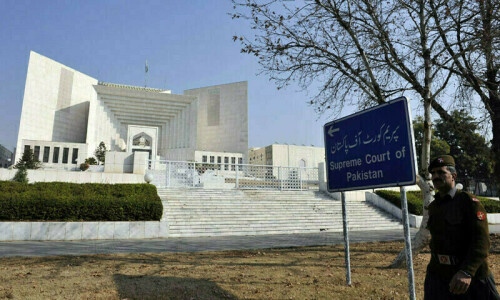
LIKE so many past terrorist attacks, there was forewarning of the latest suicide bombing that struck Lahore on Monday. Yet the carnage could not be prevented. Despite the alert, the bomber managed to reach his target, killing over a dozen people including two senior police officers. The incident occurred right in the heart of the provincial capital — a grim reminder of the impunity enjoyed by terrorist networks.
It doesn’t matter which militant faction operating from the sanctuary across the border in Afghanistan claims responsibility; the fact is that the attack was facilitated by a network working inside the country. The Lahore attack is yet another example of our failure to act in a timely fashion on an intelligence warning and avert tragedy.
It happened at a time we are trying to convince the world that terrorists are on the run and our major cities are safe to hold international sporting and cultural events. For sure, the level of militant violence has come down significantly compared to previous years. But the latest attack shows how easy it is for the militants to regroup and launch spectacular attacks with the state still reluctant to act against the major sources of militancy without exception.
The Lahore bombing was waiting to happen.
Given this state of affairs, it is not surprising to see terrorism rearing its ugly head yet again. The Charing Cross bombing has validated Justice Qazi Faez Isa’s indictment of state institutions, particularly of the federal interior ministry, for failing to act more effectively against proscribed militant and sectarian groups operating under new banners. The Justice Isa commission report on the Quetta hospital bombing last August, which wiped out almost an entire generation of senior lawyers in Balochistan, was released in December.
Instead of accepting responsibility, the interior minister had angrily dismissed the allegation. The Lahore attack does not need a new commission of inquiry but it does require that Justice Isa’s report be taken more seriously and its recommendations implemented. Though the federal and the provincial governments deny the threat, Punjab is sitting on a powder keg. The province is the hub of violent extremism with banned outfits operating freely. What is most dangerous is the ostrich-like attitude of the provincial government in the face of the grave threat.
It has almost become a ritual for the government to pledge its resolve to fight terrorism and all manifestations of extremism after each incident of violence. But that is mere rhetoric. One such example was the decision by the prime minister in the aftermath of the Quetta carnage to set up yet another committee headed by the national security adviser, retired Gen Nasser Janjua, to monitor progress on the National Action Plan.
But like more than a dozen other monitoring committees formed over the past two years, the fate of the committee remains unclear. There has hardly been any tangible sign of progress on NAP despite solemn pledges. Surely, no amount of bloodletting could force the interior minister to move against the sectarian militant groups that he declared ‘kosher’. The Lahore incident was, perhaps, waiting to happen.
Despite the claims of a widespread intelligence-based crackdown, some sectarian and militant networks are still active in many districts of south Punjab. Political expediency and the old habit of creating distinctions between ‘good’ and ‘bad’ militants makes it harder to deal with the menace. Thousands of militant suspects have reportedly been arrested by security agencies in Punjab alone over the past two years, but there is no report of their being convicted or even tried by anti-terrorism courts.
Most of the detainees are freed due to lack of evidence. An unprotected judiciary does not want to stick out its neck. The situation has become more complicated with the government’s failure to reform the country’s judicial system as promised under NAP. The military courts have also become ineffective because of the sunset clause. That means detained suspects will either be freed or languish in jail without trial.
Also, the alleged extrajudicial killings of some high-profile sectarian militant leaders do not solve the problem in the long term. Given the constant supply of ‘holy warriors’ coming out of radicalised seminaries, it is extremely difficult to eradicate militancy with short-term measures. These cannot be a substitute for an overarching counterterrorism and counter-extremism strategy.
Most alarming are the intelligence reports about members of the outlawed Lashkar-e-Taiba (LeT) now operating under the banner of Jamaatud Dawa getting involved with the militant Islamic State (IS) group. The footprints of the global jihadi group were found in several terrorist attacks across the country, though the government has downplayed such reports.
It may be true that IS does not have any organisational structure in the country but the threat cannot be underestimated. Many recent terrorist attacks including the one in Lahore have been claimed by TTP factions that have reportedly pledged to support IS. Reports of an emerging nexus between members of banned militant outfits and IS must be taken more seriously.
Unsurprisingly, foreign hands are being blamed for the latest wave of militant violence. It is certainly the easiest thing to do to cover up one’s own failure. While one must not completely rule out the possibility of foreign involvement particularly given the current regional tensions, it is also true that our own people are facilitating these attacks. Outside forces can only fish in troubled waters and surely our inaction provides them with an enabling environment.
The Charing Cross bombing must serve as yet another eye-opener for state institutions. It is surely a protracted battle which can only be won if we take the threat seriously. Our half-hearted actions make the terrorist stronger. Our leaders must go beyond empty rhetoric and ritualistic condemnation. In order to prevent Lahore-like terrorist attacks from recurring, the militant sanctuaries and support networks in both southern and northern Punjab must be dismantled.
The writer is an author and journalist.
Twitter: @hidhussain
Published in Dawn, February 15th, 2017













































